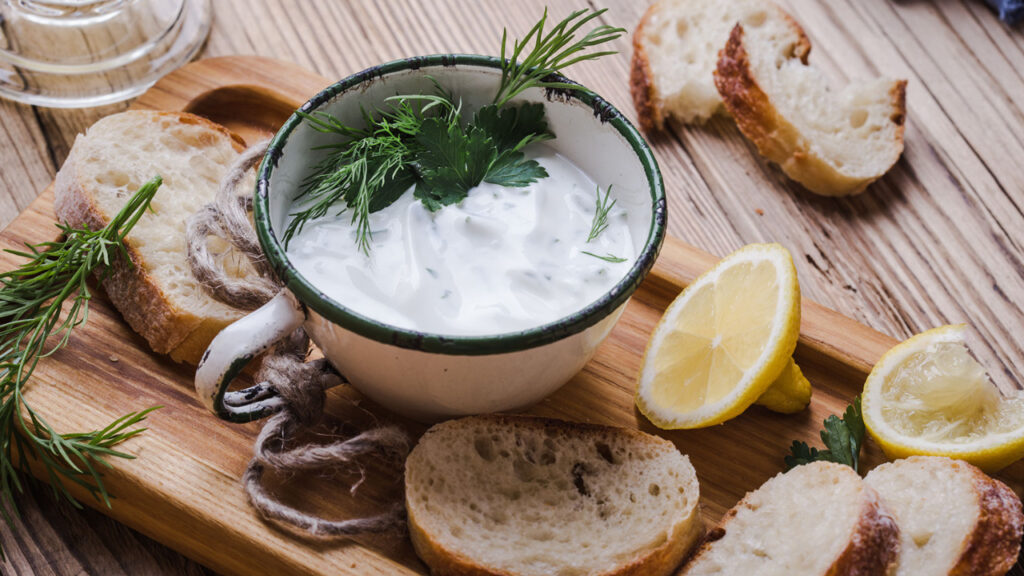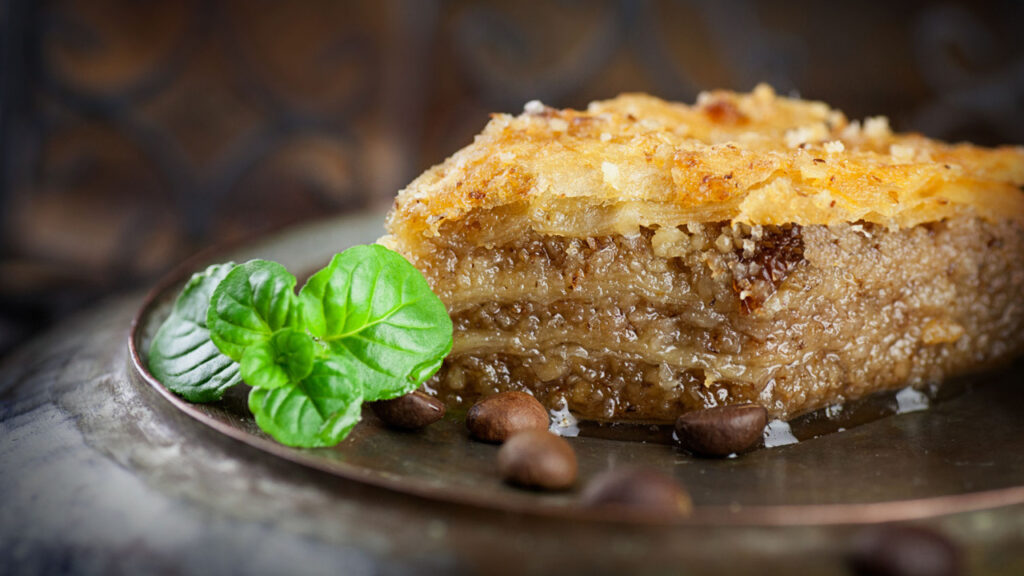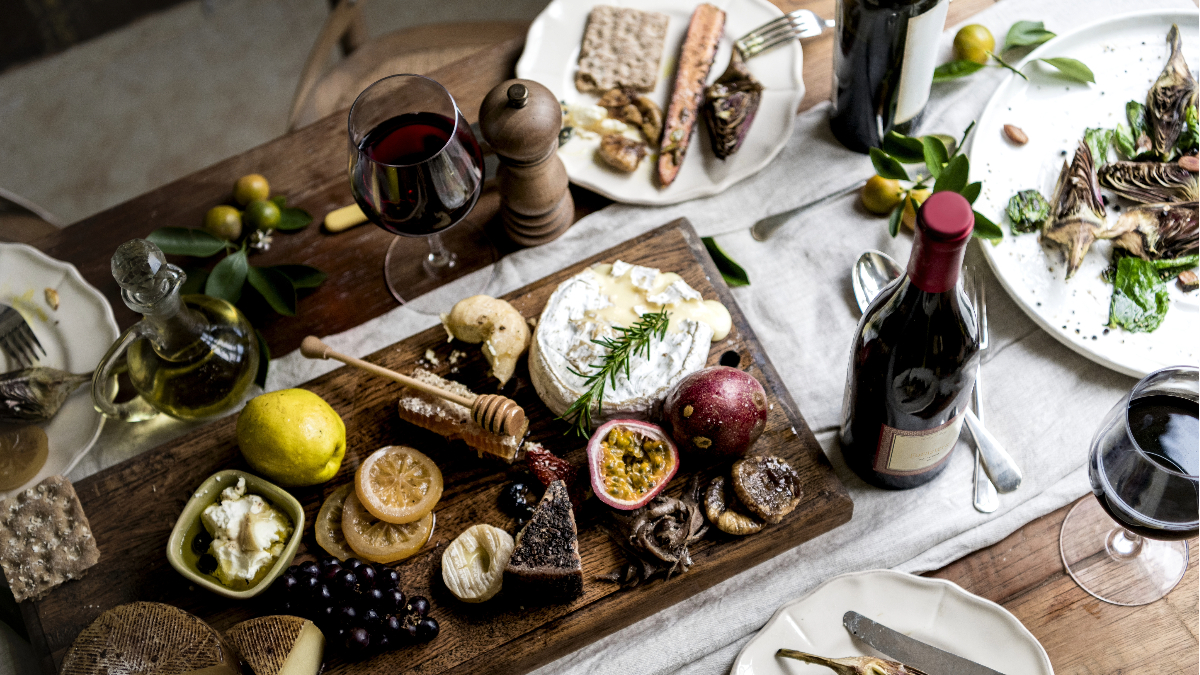There’s a certain magic that happens when two people decide to share their life’s journey. Just as magical is the blending of flavours, traditions, and memories that good food brings to the table. The first time we tasted Greek cuisine, it felt like a warm embrace; a symphony of fresh ingredients dancing in harmony. And what could be more fitting for a day that celebrates love and unity than a menu inspired by the sun-kissed shores of Greece? From classic moussaka to the tangy kick of tzatziki, Greek dishes offer more than just a meal; they offer an experience. Let’s embark on this culinary journey and explore how to infuse your wedding menu with a touch of Mediterranean charm.
▶️ Read also: Your guide to a Greek destination wedding
Five reasons to choose Greek cuisine
Greece, known for its picturesque landscapes, ancient ruins, and vibrant culture, has also gifted the world with its delectable cuisine. In any case, that is our opinion. Greek dishes focus on fresh ingredients, healthy olive oil, and the fine balance of herbs and spices.
- Deep-Rooted traditions: Each dish in Greek cuisine has a story, a history, echoing centuries of traditions. Serving Greek food is more than just offering a meal; it’s about sharing stories and centuries-old traditions with your loved ones.
- Health benefits: Greek food doesn’t just taste good; it does good. Bursting with fresh vegetables, lean meats, and heart-healthy olive oil, Greek dishes are a testament to the fact that delicious can also be nutritious. The Mediterranean diet, of which Greek cuisine is a cornerstone, is often touted for its health benefits, including heart health and longevity.
- Variety galore: Whatever the dietary preferences or restrictions of your guests, Greek cuisine has something to offer. From vegetarian marvels like spanakopita to carnivore delights like gyros, there’s a dish for every palate.
- Symbolism and romance: Many elements of Greek cuisine are steeped in symbolism. For instance, almonds, often used in Greek desserts, are a symbol of happiness and fertility. Serving dishes with such symbolic meanings can add another layer of depth to your wedding celebration.
- Communal and festive: Greek meals are often about coming together, sharing, and celebrating. Large platters, shared dips, and communal desserts embody the spirit of togetherness. This approach to dining aligns beautifully with the essence of a wedding — two families becoming one.
Which Greek dishes to serve at your wedding?
▶️ Read also: Dealing with dietary requirements at a European wedding
Starter suggestions: A delightful beginning
Kickstart your wedding feast with these appetising Greek starters:
- Tzatziki (photo): A refreshing yoghurt dip with cucumber, garlic, and dill. Perfect with warm pita bread.
- Dolmades: Vine leaves stuffed with rice and herbs, an epitome of the rich flavours of Greek cuisine.
- Spanakopita: Spinach and feta pie wrapped in flaky phyllo dough.

Main course: A feast for the senses
For the main event, indulge in these classic Greek dishes:
- Moussaka (here is a recipe): Layered aubergine, potato, and spiced meat sauce topped with béchamel. A rich and comforting dish that’s always a crowd-pleaser.
- Souvlaki (photo): Grilled meat skewers, typically served with tzatziki and pita. Opt for lamb, chicken, or even pork.
- Pastitsio: Think of it as the Greek version of lasagna. Layers of pasta, minced meat, and creamy béchamel sauce.

🥗 Vegetarian Alternatives:
For your vegetarian guests, consider:
- Gemista: Tomatoes and peppers stuffed with rice and herbs.
- Fasolada: A comforting white bean soup, often dubbed as the ‘national food of the Greeks’.
Desserts: A sweet end
No Greek feast is complete without a taste of its iconic desserts:
- Baklava (photo): Thin layers of phyllo dough filled with nuts and sweetened with honey syrup.
- Galaktoboureko: A custard pie wrapped in phyllo and bathed in sweet syrup.
- Loukoumades: Golden fried dough balls, drizzled with honey and sprinkled with cinnamon.

And don’t forget the drinks and spirits
Complement your meal with traditional Greek beverages:
- Ouzo: An anise-flavoured aperitif, best enjoyed with a splash of water.
- Retsina: A unique Greek white or rosé wine with a distinctive pine flavour.
- Metaxa: A famous Greek spirit made from wine, herbs, and floral notes.
Incorporating Greek flavours: Some tips and tricks
So, you’re intrigued by the idea of adding a Grecian twist to your wedding menu, but not sure where to begin? Fear not! Blending the richness of Greek cuisine with other culinary traditions or your personal favourites can be a delightful adventure. Here’s how to infuse that distinct Mediterranean charm into your celebration without going overboard:
- Fusion dishes: Marry the best of both worlds by creating fusion dishes. Imagine a Greek-style risotto with feta and olives, or a moussaka lasagna. Combining familiar dishes with Greek elements can be a delightful surprise for your guests.
- Themed stations: If you’re not keen on a full-blown Greek main course, why not designate a ‘Greek corner’ in your buffet? This can have a selection of Greek dips, salads, bread, and even a live souvlaki grilling station. It allows guests to indulge as per their preference.
- A course affair: Another subtle way to introduce Greek flavours is through a particular course. Maybe start with Greek appetisers or end the meal with a range of Greek desserts. This way, the unique taste stands out, but doesn’t overshadow other cuisines you might want to feature.
- Greek wine pairings: Elevate your meal by pairing dishes with Greek wines. The rich and varied terroir of Greece produces some exceptional wines. From the crisp Assyrtiko white wines of Santorini to the robust Agiorgitiko reds of the Peloponnese, there’s a Greek wine for every dish and palate.
- Decor and presentation: The presentation can enhance the culinary experience. Consider using traditional Greek pottery or blue and white colour-themed dishes for serving. Olive branches can be used for table decorations or even as charming centrepieces.
- Interactive experiences: Engage your guests with experiences like an olive oil tasting bar, where they can sample different Greek olive oils with fresh bread. Or even a ‘make-your-own gyro’ station, letting guests customise their wraps.
- Taster menus: If you’re worried about introducing too many unfamiliar flavours, offer a taster menu. Small portions of various Greek dishes can be served, allowing guests to indulge in a variety of flavours without committing to a full plate.
- Consult with a Greek chef: If in doubt, it’s always a good idea to consult someone well-versed in Greek cuisine. They can provide insights, suggest popular dishes, and even help in curating a menu that aligns with your vision.
Remember, your wedding is a reflection of your unique story. By integrating Greek flavours, you’re not just serving food; you’re offering a slice of the Mediterranean’s rich heritage, warmth, and celebratory spirit. Go on, let the odyssey of tastes elevate your special day!






